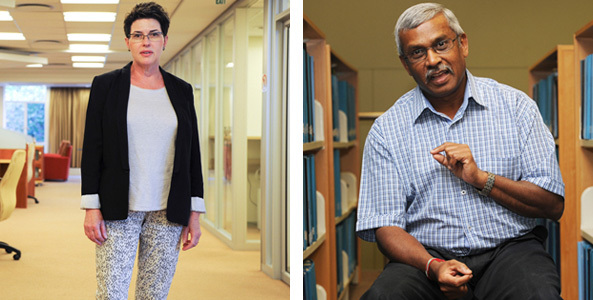New brooms sweep in the digital age at UCT libraries
17 February 2014
The new deputy directors of UCT libraries have very different roles, yet they seem to have a lot in common - including a love of reading.
Drs Dale Peters and Reggie Raju, deputy directors of technical and client liaison services respectively, both hail from Durban, obtaining their doctorates in library and information science from the University of KwaZulu-Natal (UKZN). They also share a fondness for Louis L'Amour's Westerns. Raju has the entire collection of L'Amour's novels, while Peters' brother, who was "crazy about L'Amour" handed his books on to her when she was a child. Both have been involved with academic libraries for 30 years or more. Peters is a compulsive reader with a penchant for South African literature, while Raju - when he's not reading research documents - rereads his L'Amour novels or books by Frederick Forsyth.
Raju is married to Associate Professor Jaya Raju, head of the library and information studies centre (LISC), with whom he has co-written numerous research articles, chapters in books, and a book.
Like Raju, Peters got into library services by chance. She originally wanted to be an archivist, but needed a foreign language to study that. "So I defaulted to library and information science, which was really lucky, given the opportunities afforded me to develop new strategies that ensure the relevance of the library in the digital age," she adds.
In 1984 Raju found employment as a messenger at UKZN's library. He worked his way up to subject librarian and headed up UKZN's Law Library from 1994 to 2008. From 2008 to 2013 he was director of client services at Stellenbosch University's library, before coming to UCT.
Peters started out in library acquisitions at UKZN, progressed to preservation - where she was responsible for the conservation of books and works of art - before moving into the digital realm. "Collections were increasingly becoming digitised in order to preserve the originals," she explained.
For two years she worked at the University of Goettingen in Germany as scientific technical manager, and spearheaded an EU-funded e-infrastructure project called DRIVER (Digital Repository Infrastructure Vision for European Research). She returned to UKZN and worked in their IT department until she joined UCT towards the end of 2013.
Peters and Raju speak passionately about the move from information management to data management. They are involved in different aspects of this trend in library services. "I came here with the distinct purpose to formalise research data management," says Peters. Some of Peters' responsibilities revolve around developing policy, architecture and services in the digital library infrastructure.
Raju looks at ways that library users can be better accommodated in the increasingly digitised library environment. "A library is far more than just the physical entity. It is now the virtual as well as physical the entity." Another trend that influences library services is the greater emphasis on collaborative learning - where students are required to work in groups instead of individually. "Hopefully my appointment here would see the (knowledge) commons taking on a different flavour - becoming a space where debate is encouraged and where peer-to-peer learning takes place," adds Raju.
Staff development is firmly on the agenda for these deputy directors. "Having come through the ranks, I have a passion for getting colleagues to exploit the environment they find themselves in - you can't be in an academic environment and not engage in academic learning," believes Raju.
Peters has been involved in digital libraries for 20 years, having led a programme named Digital Innovation SA (DISA), which was funded by the Andrew W Mellon Foundation. She finds it gratifying that DISA bore fruit, as the UCT Libraries now has a dedicated digitisation unit. "It's very satisfying to come back to find that the work you did 10 years ago has actually taken root and is growing," adding that to her knowledge, UCT is the only university in South Africa to have operationalised such a unit.
Story by Abigail Calata. Image by Michael Hammond.
 This work is licensed under a Creative Commons Attribution-NoDerivatives 4.0 International License.
This work is licensed under a Creative Commons Attribution-NoDerivatives 4.0 International License.
Please view the republishing articles page for more information.










